12 August 2014 (Aggie Theatre, Ft. Collins CO)
Ft. Collins is quite lucky, it seems. As Future Islands winds their tour across America, they managed to squeeze in a single show in Ft. Collins on the way to Salt Lake City. After looping through California, they'll pass through Denver later in the month at the Gothic, but that show is already sold out. So, we got to see them first and, although the turnout was good, it wasn't over-packed like a sold-out show.
It didn't turn out to be an particularly late night either. Tour mates, Operators, were the only opener and Future Islands followed them with a good show and still wrapped up their encore around 11ish.
 Dan Boeckner, from Wolf Parade and Divine Fits, kicked things off with his latest band, Operators.
Dan Boeckner, from Wolf Parade and Divine Fits, kicked things off with his latest band, Operators.
The line up features his previous bandmate Sam Browne (Divine Fits) on drums and electronics artiste Devojka tweaking buttons and dials. Their opening song blended a classic synth pop sound with Tom Tom Club dance beats. Crowded against the front of the stage, the trio offered a study in contrasts. Brown was deeply focused as he pounded out the rhythm, barely noticing the audience at all. Boekcner, on the other end of the line, was full of anxious energy as he paced forward and back. In between these two extremes, Devojka directed most of her attention towards her table full of toys, but she still engaged with the crowd.

As the set progressed, Operators settled into an electro-pop flavored post-punk feel, somewhat like Shriekback partnering with a laptop artist. Looping synth arpeggios and beep-boop punctuated dance grooves kept the crowd moving. While the bottom end was covered well enough, I would have appreciated a real bass player to partner with Brown's solid drum work.
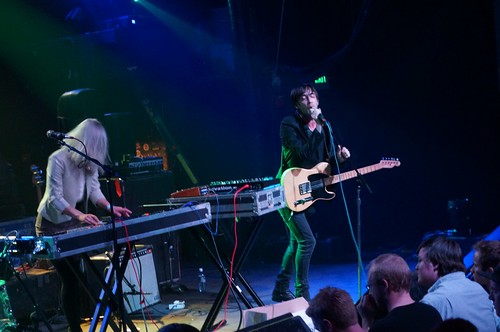
While I enjoy listening to the gear-driven beats, to some extent, they leave me cold during a live performance. The obsessive knob-work and frantic activity can add a serving of sweeps and laser tones, but they never quite relate to the steady roll of the backing track. Fortunately, Boeckner's charisma and stage presence were exciting enough to carry the show. The crowd was primed with plenty of his fans, several of whom called for tunes from his older bands. Eventually, Devojka got irked enough to ask the audience member if they could play the song ("If not, shut up"). In any case, the energizing pop repetition of the music was a good warm up for Future Islands.
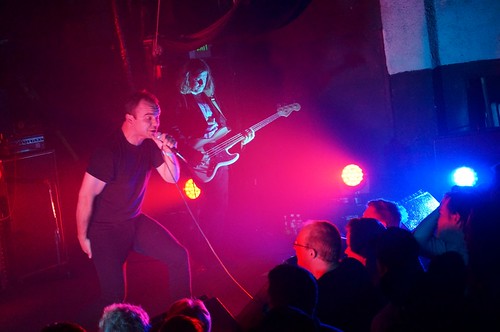 There is an aesthetic concept called the "uncanny valley", which quantifies how people react to things that are near, but not quite human. For example, robots, dolls, and clowns can each trigger a kind of aversion when they fall into that space between clearly artificial and a natural human appearance or behavior. The more times I see Samuel T. Herring perform, I can't help but revisit that concept as I watch his stylized movements and unnatural dance moves. He doesn't trigger a sharp repulsion, but he's off by just enough to make his performance riveting in its strangeness.
There is an aesthetic concept called the "uncanny valley", which quantifies how people react to things that are near, but not quite human. For example, robots, dolls, and clowns can each trigger a kind of aversion when they fall into that space between clearly artificial and a natural human appearance or behavior. The more times I see Samuel T. Herring perform, I can't help but revisit that concept as I watch his stylized movements and unnatural dance moves. He doesn't trigger a sharp repulsion, but he's off by just enough to make his performance riveting in its strangeness.
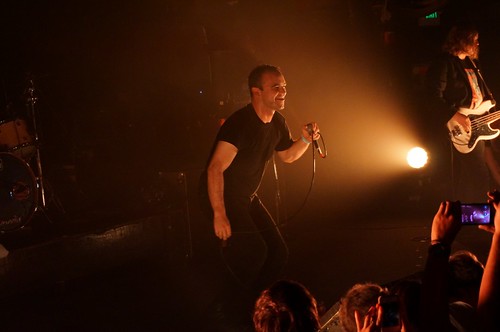
While he was actually singing, he tended towards overly emotional theatricality, with melodramatic gestures and exaggerated facial expressions. In between his lines, though, he surrendered to his inner muse and chaotically danced with wild lunges and stiff-postured positions. On the one hand, this physicality was cool; there was the sense that Herring was channeling the song with his outsider-artist choreography. But as he waved his arms and crouched like a gorilla, mimed tearing away the mask of his face, or spasmed into a fixed-stare duck walk, it was hard not to be gobstopped. That oddness is certainly part of why the band has hit it so big in the wake of their David Letterman appearance.
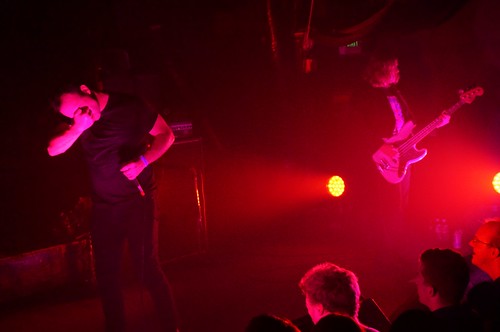
Fortunately, Future Islands had more going for them than a sideshow performance. First of all, the band was remarkably tight. They casually delivered perfection in form of danceable tunes where every note was polished and carefully placed. That distilled performance could have turned cold and mechanical, but between the deeply personal tone of the songs and Herring's expressiveness, the music was surprisingly emotional, especially for a synth-driven pop band. In sharp contrast to their frontman, William Cashion, Gerrit Welmers and their touring drummer all played with a restrained economy. Cahsion moved the most as he played his bass, but seldom got further than two steps from where he started. Welmers almost melted into his keyboards, barely acknowledging the audience or the rest of the band, even when Herring introduced the players during "Spirit".
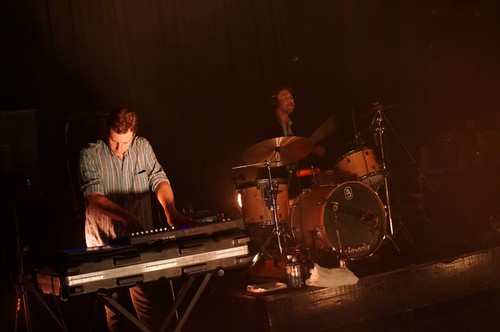
Future Islands slid through their set with little pause, moving from hypnotically danceable interludes to driving bass-driven darkness and then shifting into soulful brooding. Late in the set, Herring surprised me, though, with an unexpected bit of humor. During "A Song For Our Grandfathers", he spent much of the tune gazing up to his right, as though looking up to Heaven. After wrapping it up, he paused and then gestured up at the large posters that decorate the walls of the Aggie. He pointed up at the one he'd been staring at and said, "By the way, my grandfather isn't Tech N9ne." That little bit of self-deprecation made up for a lot of crazy dance moves.
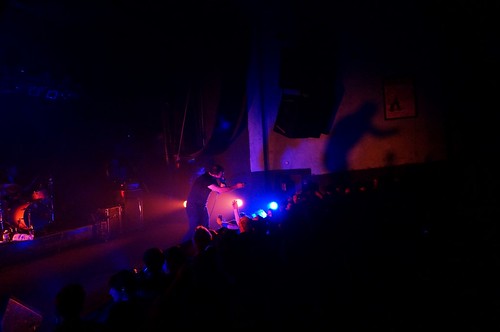
Vocally, Herring veered from a strained soul tone reminiscent of Roland Gift (Fine Young Cannibals) to hoarse, death metal growls. Those changes were all in service to the whatever raw sense he was trying to evoke at any given moment. He apologized a few times about his voice, but seemed to give everything he had to his performance. By the end of the night, his tight black shirt was soaked with sweat and he looked a bit drawn. Future Islands finished out their three song encore with "Little Dreamer" and Herring was finally able to take a well-deserved break.
More photos on my Flickr.
Ft. Collins is quite lucky, it seems. As Future Islands winds their tour across America, they managed to squeeze in a single show in Ft. Collins on the way to Salt Lake City. After looping through California, they'll pass through Denver later in the month at the Gothic, but that show is already sold out. So, we got to see them first and, although the turnout was good, it wasn't over-packed like a sold-out show.
It didn't turn out to be an particularly late night either. Tour mates, Operators, were the only opener and Future Islands followed them with a good show and still wrapped up their encore around 11ish.
 Dan Boeckner, from Wolf Parade and Divine Fits, kicked things off with his latest band, Operators.
Dan Boeckner, from Wolf Parade and Divine Fits, kicked things off with his latest band, Operators.The line up features his previous bandmate Sam Browne (Divine Fits) on drums and electronics artiste Devojka tweaking buttons and dials. Their opening song blended a classic synth pop sound with Tom Tom Club dance beats. Crowded against the front of the stage, the trio offered a study in contrasts. Brown was deeply focused as he pounded out the rhythm, barely noticing the audience at all. Boekcner, on the other end of the line, was full of anxious energy as he paced forward and back. In between these two extremes, Devojka directed most of her attention towards her table full of toys, but she still engaged with the crowd.

As the set progressed, Operators settled into an electro-pop flavored post-punk feel, somewhat like Shriekback partnering with a laptop artist. Looping synth arpeggios and beep-boop punctuated dance grooves kept the crowd moving. While the bottom end was covered well enough, I would have appreciated a real bass player to partner with Brown's solid drum work.

While I enjoy listening to the gear-driven beats, to some extent, they leave me cold during a live performance. The obsessive knob-work and frantic activity can add a serving of sweeps and laser tones, but they never quite relate to the steady roll of the backing track. Fortunately, Boeckner's charisma and stage presence were exciting enough to carry the show. The crowd was primed with plenty of his fans, several of whom called for tunes from his older bands. Eventually, Devojka got irked enough to ask the audience member if they could play the song ("If not, shut up"). In any case, the energizing pop repetition of the music was a good warm up for Future Islands.
 There is an aesthetic concept called the "uncanny valley", which quantifies how people react to things that are near, but not quite human. For example, robots, dolls, and clowns can each trigger a kind of aversion when they fall into that space between clearly artificial and a natural human appearance or behavior. The more times I see Samuel T. Herring perform, I can't help but revisit that concept as I watch his stylized movements and unnatural dance moves. He doesn't trigger a sharp repulsion, but he's off by just enough to make his performance riveting in its strangeness.
There is an aesthetic concept called the "uncanny valley", which quantifies how people react to things that are near, but not quite human. For example, robots, dolls, and clowns can each trigger a kind of aversion when they fall into that space between clearly artificial and a natural human appearance or behavior. The more times I see Samuel T. Herring perform, I can't help but revisit that concept as I watch his stylized movements and unnatural dance moves. He doesn't trigger a sharp repulsion, but he's off by just enough to make his performance riveting in its strangeness.
While he was actually singing, he tended towards overly emotional theatricality, with melodramatic gestures and exaggerated facial expressions. In between his lines, though, he surrendered to his inner muse and chaotically danced with wild lunges and stiff-postured positions. On the one hand, this physicality was cool; there was the sense that Herring was channeling the song with his outsider-artist choreography. But as he waved his arms and crouched like a gorilla, mimed tearing away the mask of his face, or spasmed into a fixed-stare duck walk, it was hard not to be gobstopped. That oddness is certainly part of why the band has hit it so big in the wake of their David Letterman appearance.

Fortunately, Future Islands had more going for them than a sideshow performance. First of all, the band was remarkably tight. They casually delivered perfection in form of danceable tunes where every note was polished and carefully placed. That distilled performance could have turned cold and mechanical, but between the deeply personal tone of the songs and Herring's expressiveness, the music was surprisingly emotional, especially for a synth-driven pop band. In sharp contrast to their frontman, William Cashion, Gerrit Welmers and their touring drummer all played with a restrained economy. Cahsion moved the most as he played his bass, but seldom got further than two steps from where he started. Welmers almost melted into his keyboards, barely acknowledging the audience or the rest of the band, even when Herring introduced the players during "Spirit".

Future Islands slid through their set with little pause, moving from hypnotically danceable interludes to driving bass-driven darkness and then shifting into soulful brooding. Late in the set, Herring surprised me, though, with an unexpected bit of humor. During "A Song For Our Grandfathers", he spent much of the tune gazing up to his right, as though looking up to Heaven. After wrapping it up, he paused and then gestured up at the large posters that decorate the walls of the Aggie. He pointed up at the one he'd been staring at and said, "By the way, my grandfather isn't Tech N9ne." That little bit of self-deprecation made up for a lot of crazy dance moves.

Vocally, Herring veered from a strained soul tone reminiscent of Roland Gift (Fine Young Cannibals) to hoarse, death metal growls. Those changes were all in service to the whatever raw sense he was trying to evoke at any given moment. He apologized a few times about his voice, but seemed to give everything he had to his performance. By the end of the night, his tight black shirt was soaked with sweat and he looked a bit drawn. Future Islands finished out their three song encore with "Little Dreamer" and Herring was finally able to take a well-deserved break.
More photos on my Flickr.

 My first taste from
My first taste from  Have you heard the story of the boy who sang “wolf?”
Have you heard the story of the boy who sang “wolf?”  Go ahead, judge
Go ahead, judge